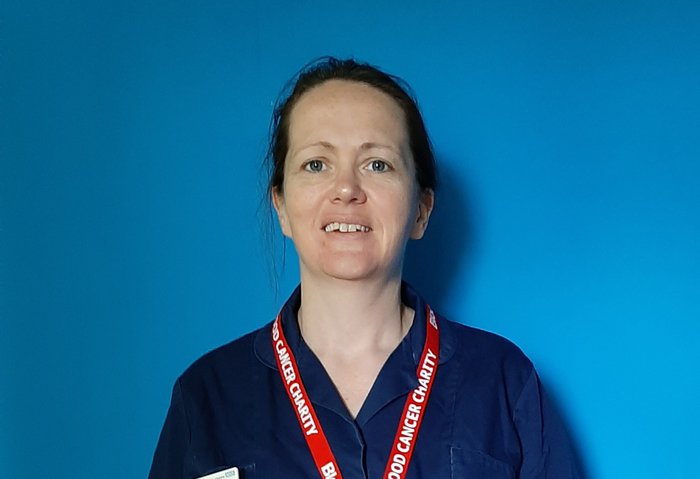Meet Alison, our blood cancer clinical nurse specialist
We're getting to know more about Alison Paterson, a blood cancer clinical nurse specialist and member of our Nurses Working Group. Find out why she became a nurse and what it's like to work on the front line during this pandemic.

Introducing Alison
Alison is a member of our Nurses Working Group who advises us on how we can provide the best possible support for people affected by blood cancer.
Alison has helped to shape and influence our healthcare professional education events and other activities. This International Nurses' Day, we'd like to thank Alison and all our nursing community for their hard work and support in caring for people affected by blood cancer, particularly during the coronavirus pandemic.
What’s your role and where do you work?
I'm a haemato-oncology clinical nurse specialist at East and North Hertfordshire NHS. I work across three of its sites: Lister Hospital in Stevenage, the Queen Elizabeth II Hospital in Hertford.
What motivated you to become a nurse, particularly specialising in haemato-oncology?
I wanted to be a nurse for a long time, since I was at school. As part of my training at the University of Liverpool, I went on a management placement on a haemato-oncology ward.
I moved to London when I qualified and worked on the Dacie ward – in the bone marrow transplant unit – at Hammersmith Hospital. At the time, we were the specialist centre for transplants for people with Chronic Myeloid Leukaemia.
What are your main responsibilities?
My colleagues and I work across the whole haemato-oncology pathway, which covers all the different types of blood cancers.
We oversee all the new diagnoses and changes in treatments. We also deal with the complex physical and psychological issues that arise from a diagnosis or treatment of blood cancer.
We're still in our roles. Our Trust hasn't redeployed us like others have.
Although I have been helping in the chemotherapy suite, which I wouldn't do as part of my day to day role.
Our workload has increased significantly. Initially, patients were ringing to see if they were on the extremely vulnerable list. Some patients, who were in remission for years, called after receiving a letter thinking this meant they had relapsed.
We’re also finding that the telephone clinics have extra queries from patients who are unsure of the tablets they should be taking, and about prescriptions and blood tests.
In addition, we are having some difficult conversations with patients about stopping or changing treatments due to the coronavirus. It's hard when you can’t quantify the risks involved, which is why it’s important that we follow national guidance that have been approved locally.
How have these changes impacted your patients?
I have to say, there have been some positive impacts, such as no more waiting for blood tests or chemotherapy slots. Some people are happy with telephone reviews, and they no longer wait for clinical appointments. Whilst others crave the reassurance of a face to face visit.
Some patients have decided not to proceed with investigations or end of treatment scans due to the risk of the virus. I worry that when these patients do decide they want to have the scan, there will be a big backlog or their cancer will have progressed.
We’ve also had problems with patients who are shielding. Those who haven’t received an NHS letter are not able to get food deliveries, which is a national issue. I know Blood Cancer UK has been campaigning on this. Our Trust has been great at arranging prescription deliveries and domiciliary bloods, where they are essential.
Name one daily activity that has helped you and your colleagues take care during this period
I downloaded the Unmind app, which is currently free for NHS staff. I'm finding that really helpful.
I regularly signpost patients to your coronavirus hub. Especially as booklets are taking longer to get to patients with the post delays. Your campaigns asking supermarkets to prioritise shopping slots for people affected by blood cancer is really helpful.
What’s one piece of advice you’d give to colleagues who are working hard, like you, to care for patients during the pandemic?
Be kind to yourself, you can’t do everything. As long as you’ve done your best, whatever your best is that day, then you have succeeded.
We've developed resources around current guidelines, learning resources, health and wellbeing and advance care planning to support you and your colleagues during this time.
Join our Nurses Working Group
Help shape our work to deliver the best care and support to people with blood cancer.
